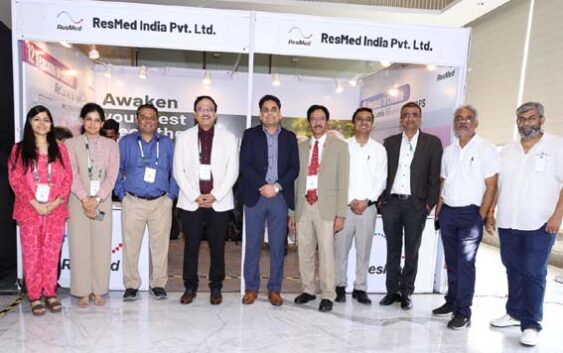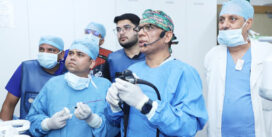Snoring is not a sign of deep sleep; it is a symptom of sleep apnea

• A two-day conference on sleep disorder is being held in Indore
• The first day featured special discussions on snoring, sleep apnea, and insomnia
• Adults need 8 hours of sleep, while children need 10 hours for good health
• The second day will include a special event for the general public, where they can get free advice from sleep experts
Indore, October 05, 2024: In the fast-paced life we lead, sleep problems have become common. Work, pressure from jobs, ambitions, an unhealthy lifestyle, and above all, excessive use of social media and gadgets have severely impacted our sleep habits. Due to the increasing impact of these issues, the scope of study around sleep is expanding, and sleep medicine is gaining recognition as a field of study.
For the first time in Central India, the South East Asian Academy of Sleep Medicine (SEAASM) organized a two-day international conference in Indore to discuss sleep, sleep disorders, diagnosis, and new treatment techniques. On the first day, October 5, experts talked about various sleep disorders such as insomnia, sleep deprivation, snoring, and sleepwalking, including their causes, diagnosis, and treatment. Sleep specialists from India and abroad, chest specialists, dental specialists, ENT specialists, neurologists, psychologists,paediatrician and others interested in the field participated and shared their experiences.
The conference was inaugurated in the evening in the presence of Honorable Mayor Pushyamitra Bhargav, where well-known doctors like Apurva Pauranik and educator Swapnil Kothari shared their thoughts.
On the first day, renowned sleep experts from around the world discussed topics like EEG scoring for obstructive sleep apnea, PSG studies, non-invasive ventilation (NIV), chronic ventilatory failure in NIV, telemonitoring in sleep medicine, narcolepsy, and S-Air data, through their lectures and presentations. They addressed sleep disorders such as insomnia, sleep deprivation, snoring, and sleepwalking, as well as advanced treatment options for diagnosis and treatment.
While discussing the different stages of sleep, Dr. Rajesh Swarnkar, President of the South East Asian Academy of Sleep Medicine (SEAASM), stated, “Currently, sleep-related issues have become very common, and the more we talk about these disorders, the better it is. Many people do sleep but do not feel rested, and understanding sleep is crucial to understanding this phenomenon. There are primarily four stages of sleep:
Stage 1: The initial stage of sleep
When you start to fall asleep, you enter the first stage, which usually lasts only a few minutes. During this time, the heartbeat and breathing slow down. The muscles begin to relax, and the brain produces alpha and theta brain waves.
Stage 2: About 25 minutes after falling asleep
This is the second stage of sleep. It is a light sleep period that occurs shortly after falling asleep. Before entering deep sleep, this stage lasts for about 25 minutes. During this time, the heartbeat slows down, there is no eye movement, and body temperature starts to decrease. The brain waves oscillate, creating “sleep spindles.”
Stage 3: The onset of deep sleep
Known as delta sleep, this is when you are in deep sleep. During this stage, the heartbeat and breathing slow to their lowest rates. The body is completely relaxed, and delta brain waves become present.
Stage 4: The stage when we dream
This is the deepest stage of sleep, characterized by rapid eye movement (REM). During this time, breathing and heart rates increase, and brain activity becomes significantly higher. We are in a very deep sleep, dreaming and processing our memories.
Individuals struggling with sleep disorders often reach only the second stage and are deprived of deep sleep. Sleep deprivation can lead to various diseases related to the heart, brain, digestion, and respiration.
According to Dr. Himanshu Garg, a sleep and respiratory specialist from Australia, “Just as a healthy diet and lifestyle are essential for good health, so is sufficient sleep. Regardless of how much work you have or how little time you feel you have, you must allocate enough time to complete your sleep. There are many myths surrounding sleep, such as the belief that a person who snores is sleeping peacefully, but this is not true; snoring can be an early symptom of sleep-related disorders. Snoring can cause physical discomfort as well as mental and social discomfort. Over time, snoring can lead to sleep apnea, high blood pressure, heart disease, and strokes.”
Discussing sleep-related issues, Dr. Shivani Swami, Secretary of SEAASM, mentioned, “In the past decade, sleep problems have rapidly affected us. The most concerning aspect is that we tend to ignore them, thinking of them as a common condition, but they can be extremely harmful. In recent years, medical science has advanced in the diagnosis and treatment of sleep-related disorders. This conference was organized to share information on this subject, where experts have shared their experiences.”
Regarding the second day of the event, Dr. Ravi Dosi, the organizing secretary of the conference, mentioned, “The second day will begin with a walkathon aimed at raising awareness about sleep-related problems in society. The second day will be significant not just for doctors but also for the general public. We have organized a workshop for the public on the second day, where they can seek free advice from experts regarding their sleep-related problems and queries.”
Tips for Better Sleep
To improve sleep, it’s essential to maintain a regular sleeping schedule. Try to go to bed and wake up at the same time every day, regardless of weekends or weekdays. Keep the bedroom quiet, dark, and cool. Use a comfortable bed and pillows. Stay in natural light during the day and avoid blue light from mobile phones and computers in the evening. Stress management also affects sleep quality. Practice yoga, meditation, or deep breathing to reduce stress. Pay special attention to your diet; avoid heavy meals, caffeine, and alcohol, especially before bedtime. Engage in regular exercise, but avoid exercising 3-4 hours before sleep. Drink enough water throughout the day, but don’t drink too much before bedtime, and do not ignore sleep-related problems. If sleep issues persist, seek advice from a doctor.
Mayor Mr. Bhargav described this conference as historic and highly significant, stating, “Sleep is very important for us, and discussing it is even more important. I want to congratulate and thank the organizers for deeming it necessary to talk about such an important topic.”
The first day’s program concluded with a ‘Karaoke Night,’ featuring musical performances by Dr. Pramod Jhavar, Dr. Pooja Jain, Dr. Prashant Newalkar, and Dr. Salil Bhargav.
Senior doctors like Ashok Vajpayee, Salil Bhargav, Professor RK Jha, President of the Indore Chest Society Dr. Rupesh Modi, and Dr. Narendra Patiyar played special roles in this conference organized by the South East Asian Academy of Sleep Medicine (SEAASM).


